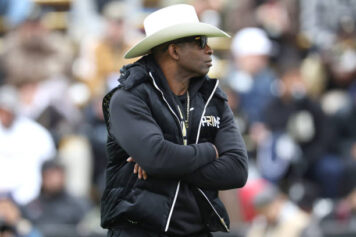Olympic Track and Field legend Edwin Moses is up on the saying, Better late than never, however it didnt apply to his dominance as a World Class athlete who went nine years and nine months without losing a race in the 400 meter hurdles. He was always on time while building an unprecedented career that took him from Morehouse College to eight-time Olympic gold medalist and invincible track god.
Thats 122 races without taking an L, setting a new and permanent standard for the definition of dominance.
For some reason, despite his glorious career, Moses never resonated as a celebrity with some fans and despite the fact that he became the sport’s first million dollar athlete, media types often misjudged him as arrogant and lacking passion.
Ridiculous as it sounds, thats probably why it has taken all of these years for Moses to finally be blessed with a Wheaties box cover.

When Moses heard that the Wheaties box with his image on the front would be in stores this month, he said, I was very impressed, because I know its a very prestigious honor to be on the box of Wheaties. Several icons in track and field, and people that I know, have been on the box starting with Bruce Jenner in 1976 so its quite an honor to be included among that subset of athletes.
His Wheaties box is long overdue, but the icon had a positive take on the situation.
I think getting the honor now actually means more,” Moses insisted. “I think when youre competing and youre young, you kind of just take it for granted that of course if you win a gold medal you might have the incredible honor of being on a Wheaties box.
Being an African-American Olympian probably delayed Edwin’s Wheaties box fame in the same way that being gay hindered four-time Olympic diving champion Greg Louganis’ legacy. Louganis and four-time gold medal swimmer Janet Evans will also be getting some long overdue Wheaties box love this month.
Louganis’ sexual preference was a subject of controversy at a time when America was still grappling with issues of acceptance concerning homosexuality.
Louganis, who swept Olympic Gold medals in the platform and springboard events in 1984 and 1988, was the subject of a petition to put the four-time Olympic diving champion on the iconic cereal box following his 2015 documentary, Back on Board.
In the film, Louganis recalls enduring derogatory anti-gay slurs from his fellow Olympians and lamented that he wasnt as celebrated as other 1980s Olympic champions.
Never got a Wheaties box, Louganis said in the film. Their response was that I didnt fit their wholesome demographics or whatever. Basically, being gay, or being rumored that I was gay.
Louganis, a prodigy who dove in his first Olympic Games at age 16, retired after the Seoul Olympics in ’88 and came out publicly as gay and HIV positive in the mid-1990’s.
But after years of feeling undervalued, Louganis has finally gotten his Wheaties box and also reunited with Team USA swimming as a mentor for young swimmers.
Moses, who grew up in Dayton, Ohio, the son of two parents who worked in education, was a devoted student first, which makes his ascent to ultimate athlete even more remarkable.
I had no ambitions to be an Olympic track star or any kind of athlete,” he once told espn.com.
In fact, when he attended Morehouse College on an academic scholarship majoring in physics and engineering, Moses had to train by jumping fences because the modest HBCU didn’t have any weights, a track, hurdles or a stadium.
Moses only competed in the 400m hurdles once before his Olympic debut in 1976, but his extreme workouts and scientific grasp of the skill made him a natural as his long legs, intelligence and deceptive speed comprised a rare hurdling package.
He won the trials in the 400 meter hurdles with an American record of 48.30 seconds, making his first Olympic team. At the age of 20, Moses won the Olympic gold medal in Montreal in grand fashion, blazing and bouncing to a world record of 47.64 seconds in his first international meet.
Leroy Walker, the US Olympic track and field coach in 1976 was captivated by Moses’ natural brilliance and complete dominance. “Extraordinary talent is obvious,” Walker once said about the track prodigy. “We’re in the rarefied presence of an immortal here. Edwin’s a crowd unto himself.”
Moses went on to snatch gold at the 1983 World Championships and the memorable 1984 LA Olympics. He rebounded from a rare defeat to win gold at the 1987 World Championships. He was still O.G. enough at 33-years-old, to capture bronze at the 1988 Seoul Olympics.
After retiring from Track & Field, he switched sports and remarkably won bronze at a World Cup bobsled race in 1990, and finished seventh at the 1991 World Championships.
Moses wasnt just an athlete. Away from the track, he was a fierce advocate for athletes rights, challenging the rules that prevented amateurs from accepting money for competing and making endorsements.
As Chairman of the U.S. Anti-Doping Agency Board of Directors and a Congressional medal of honor recipient, Moses is respected for speaking out against performing enhancing drugs and offering tough initiatives to eradicate them from the sport.
Moses and Louganis are classic examples of how history can undervalue a living legend, but correct the mistakes of the past and properly rewrite itself for accurate presentation to future generations.



